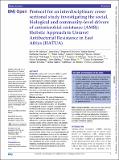Protocol for an interdisciplinary cross-sectional study investigating the social, biological and community-level drivers of antimicrobial resistance (AMR) : Holistic Approach to Unravelling Antibiotic Resistance in East Africa (HATUA)
Abstract
Introduction Antimicrobial resistance (AMR) is a global health threat that requires urgent research using a multidisciplinary approach. The biological drivers of AMR are well understood, but factors related to treatment seeking and the social contexts of antibiotic (AB) use behaviours are less understood. Here we describe the Holistic Approach to Unravel Antibacterial Resistance in East Africa, a multicentre consortium that investigates the diverse drivers of drug resistance in urinary tract infections (UTIs) in East Africa. Methods and analysis This study will take place in Uganda, Kenya and Tanzania. We will conduct geospatial mapping of AB sellers, and conduct mystery client studies and in-depth interviews (IDIs) with drug sellers to investigate AB provision practices. In parallel, we will conduct IDIs with doctors, alongside community focus groups. Clinically diagnosed patients with UTI will be recruited from healthcare centres, provide urine samples and complete a questionnaire capturing retrospective treatment pathways, sociodemographic characteristics, attitudes and knowledge. Bacterial isolates from urine and stool samples will be subject to culture and antibiotic sensitivity testing. Genomic DNA from bacterial isolates will be extracted with a subset being sequenced. A follow-up household interview will be conducted with 1800 UTI-positive patients, where further environmental samples will be collected. A subsample of patients will be interviewed using qualitative tools. Questionnaire data, microbiological analysis and qualitative data will be linked at the individual level. Quantitative data will be analysed using statistical modelling, including Bayesian network analysis, and all forms of qualitative data analysed through iterative thematic content analysis. Ethics and dissemination Approvals have been obtained from all national and local ethical review bodies in East Africa and the UK. Results will be disseminated in communities, with local and global policy stakeholders, and in academic circles. They will have great potential to inform policy, improve clinical practice and build regional pathogen surveillance capacity.
Citation
Asiimwe , B B , Kiiru , J , Mshana , S E , Neema , S , Keenan , K , Kesby , M , Mwanga , J R , Sloan , D J , Mmbaga , B T , Smith , V A , Gillespie , S H , Lynch , A G , Sandeman , A , Stelling , J , Elliott , A , Aanensen , D M , Kibiki , G E , Sabiiti , W , Holden , M T G & HATUA Consortium 2021 , ' Protocol for an interdisciplinary cross-sectional study investigating the social, biological and community-level drivers of antimicrobial resistance (AMR) : Holistic Approach to Unravelling Antibiotic Resistance in East Africa (HATUA) ' , BMJ Open , vol. 11 , no. 3 , e041418 . https://doi.org/10.1136/bmjopen-2020-041418
Publication
BMJ Open
Status
Peer reviewed
ISSN
2044-6055Type
Journal article
Description
The Holistic Approach to Unravel Antibacterial Resistance in East Africa is a 3-year Global Context Consortia Award (MR/S004785/1) funded by the National Institute for Health Research, Medical Research Council and the Department of Health and Social Care. The award is also part of the EDCTP2 programme supported by the European Union. This work is supported in part by the Makerere University-Uganda Virus Research Institute Centre of Excellence for Infection and Immunity Research and Training (MUII). MUII is supported through the DELTAS Africa Initiative (grant number 107743). The DELTAS Africa Initiative is an independent funding scheme of the African Academy of Sciences and Alliance for Accelerating Excellence in Science in Africa, and is supported by the New Partnership for Africa’s Development Planning and Coordinating Agency with funding from the Wellcome Trust (grant number 107743) and the UK Government. This paper was funded in part by a grant from the National Institutes of Health (grant number U01CA207167).Collections
Items in the St Andrews Research Repository are protected by copyright, with all rights reserved, unless otherwise indicated.

